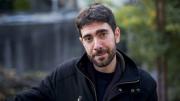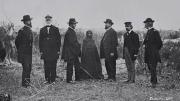Physical anthropologist Henry Field led an expedition to southern Iraq in 1934 for an anthropometric study of the Marsh Arabs, or Ma'dan. Although the large bulk of material he brought backphotographs of men in profile; record books of measurements of faces, noses, and ears; hair samplesis in the Field Museum in Chicago, he gave 120 snapshots of the marsh dwellers going about their lives to Harvard's Peabody Museum of Archaeology and Ethnology. People fish with spears, hunt wild boar (four feet high at the shoulder), build canoes, and shape houses of reeds like those of the Sumerians, the earliest non-mud architecture known. Field Photography, The Marsh Arabs of Iraq, 1934, at the museum through February, features 34 of these images, with explanatory notes by exhibition curator Omar al-Dewachi, an Iraqi who came to Harvard to study anthropology in August 2001.

|
| Top: The 85-year-old, six-foot-tall, 300-pound tribal leader Sheikh Falih al-Saihud posed for Field's camera with an eight-gauge shotgun given to him by the British. Just above: Women of the sheikh's family, who wore no veils unless they happened to go to a town. |
| Courtesy of the Peabody Museum of Archaeology and Ethnology, © President and Fellows of Harvard College |
"Growing up in Baghdad," said al-Dewachi in welcoming remarks at the opening of the exhibition on October 20, "I was never aware that the cultural slur 'Ma'dan' actually meant the Marsh Arabs. The word was loaded with meanings: unclean, socially inferior, and ignorant." To al-Dewachi, "The Ma'dan as a cultural figure had always been my Other."
He went on to earn an M.D. degree at Baghdad University and a master's in public health at American University of Beirut before coming to Harvard. His medical education further taught him that "the marshland of southern Iraq was a region plagued by endemic diseases and public-health problems."
But once in the United States, said al-Dewachi, he soon realized that "the West had a different cultural location for the Marsh Arabs, mainly through the archaeological connection with the Sumerian civilization, their self-maintained eco-system, and fascinating lifestyle." And they had become "yet another story of the devastations of the Saddam Hussein regime."
As al-Dewachi explains in notes for the exhibition, Field's science "was primarily concerned with the classification of races and identification of potential criminals according to various physical, especially facial, characteristics."
"Arriving as an Iraqi citizen in the United States to start my Ph.D. one month before the events of 9/11, I became gradually part of the institutionalization of surveillance," al-Dewachi observed at the exhibition opening. Through reporting to the immigration office, "detailed interviewing, fingerprinting, and being photographed, I came to realize how the science of the 1930s still haunts us to this day. As I tried to deal with the diffi culties of being in the United States at these times, the representation of the Marsh Arabs of Iraq has become a way for me to mediate the reality of my Otherness."






